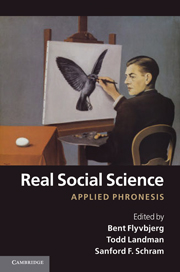Book contents
- Frontmatter
- Contents
- Figures
- Tables
- Contributors
- Acknowledgements
- 1 Introduction: new directions in social science
- Part I Theory and method
- 2 Phronetic social science: an idea whose time has come
- 3 Phronesis and narrative analysis
- 4 The feel for power games: everyday phronesis and social theory
- 5 Phronesis, projects and power research
- Part II Applied phronesis
- 6 Why mass media matter and how to work with them: phronesis and megaprojects
- 7 Power and conflict in collaborative research
- 8 Unsettling a settler society: film, phronesis and collaborative planning in small-town Canada
- 9 Phronesis and critical policy analysis: Heathrow's ‘third runway’ and the politics of sustainable aviation in the United Kingdom
- 10 Amnesty in the age of accountability: Brazil in comparative context
- 11 Feminist phronesis and technologies of citizenship
- 12 Making the teaching of social justice matter
- 13 Spatial phronesis: a case study in geosurveillance
- 14 Important next steps in phronetic social science
- Index
- References
4 - The feel for power games: everyday phronesis and social theory
Published online by Cambridge University Press: 05 June 2012
- Frontmatter
- Contents
- Figures
- Tables
- Contributors
- Acknowledgements
- 1 Introduction: new directions in social science
- Part I Theory and method
- 2 Phronetic social science: an idea whose time has come
- 3 Phronesis and narrative analysis
- 4 The feel for power games: everyday phronesis and social theory
- 5 Phronesis, projects and power research
- Part II Applied phronesis
- 6 Why mass media matter and how to work with them: phronesis and megaprojects
- 7 Power and conflict in collaborative research
- 8 Unsettling a settler society: film, phronesis and collaborative planning in small-town Canada
- 9 Phronesis and critical policy analysis: Heathrow's ‘third runway’ and the politics of sustainable aviation in the United Kingdom
- 10 Amnesty in the age of accountability: Brazil in comparative context
- 11 Feminist phronesis and technologies of citizenship
- 12 Making the teaching of social justice matter
- 13 Spatial phronesis: a case study in geosurveillance
- 14 Important next steps in phronetic social science
- Index
- References
Summary
The higher the human intellect goes in discovering more and more purposes, the more obvious it becomes that the ultimate purpose is beyond comprehension.
Leo Tolstoy, War and Peace ([1868–9] 2005: 1270)This chapter explores the relation between phronesis in doing social science and what I will call everyday phronesis. A core topic of social scientific study is the dependence of human action on phronesis, understood as people's practical wisdom in dealing with both routine decisions and unexpected contingencies. This practical wisdom seems to have three aspects: it is content, a quality of persons, and a form of action. As content, phronesis is a resource – a stock of experiential knowledge. As a quality of persons, it is what enables acquisition and appropriate use of that knowledge – a capacity. And as action, phronesis necessarily involves doing something – a practice in which experiential knowledge is both used and gained. Having phronesis is iteratively dependent on practising phronesis.
For social science phronesis has to be more than a topic; it is what social scientific study requires from researchers (Flyvbjerg 2001), and what social science seeks to enhance in those whom I will call readers. Real social science is when studying the world has the effect of changing it. This chapter discusses social theories in which the study of everyday practical wisdom works to enhance their readers’ capacity for phronesis.
- Type
- Chapter
- Information
- Real Social ScienceApplied Phronesis, pp. 48 - 65Publisher: Cambridge University PressPrint publication year: 2012
References
- 8
- Cited by



